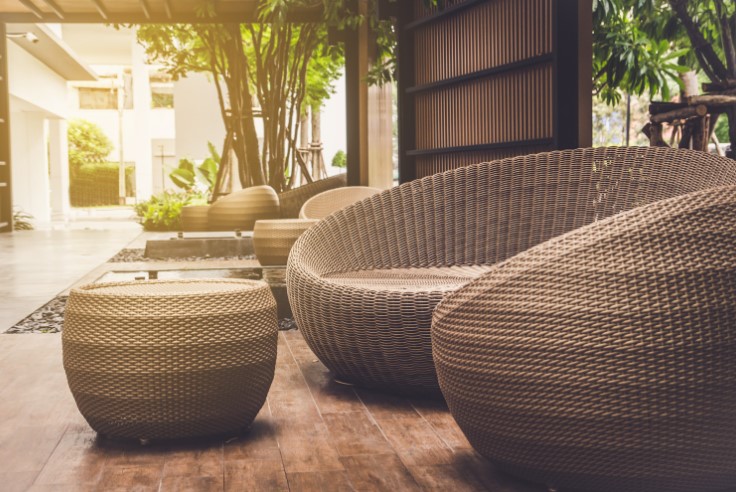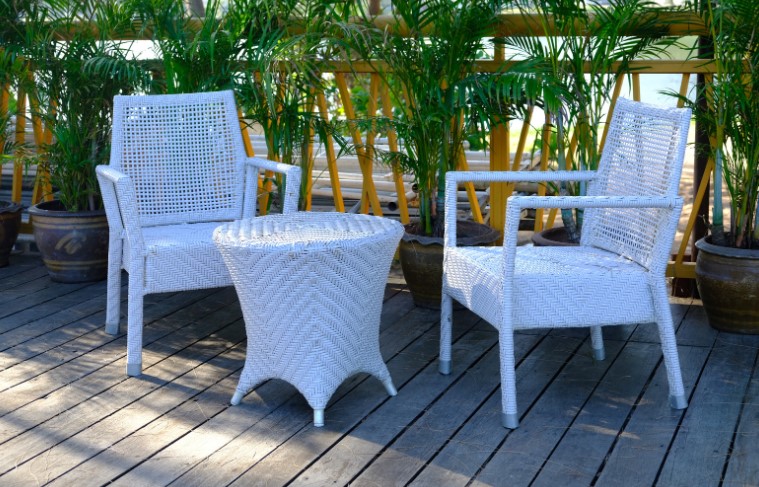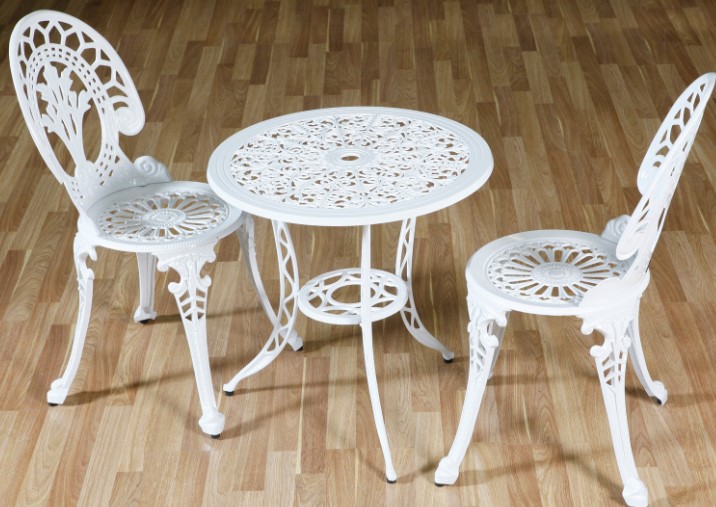- Why Is It Important To Clean Plastic Garden Furniture?
- What Supplies Do You Need For Cleaning Plastic Garden Furniture?
- How To Prepare Plastic Furniture Before Cleaning?
- Step-By-Step Guide: How To Clean Plastic Garden Furniture?
- How To Remove Algae And Mildew From Plastic Garden Furniture?
- Can You Restore Sun-Damaged Plastic Garden Furniture?
- How Often Should You Clean Your Plastic Garden Furniture?
- What are the Quick Tips For Keeping Plastic Garden Furniture Clean Longer?
- Conclusion
- Table: DIY vs. Commercial Cleaners for Plastic Garden Furniture
Plastic garden furniture is a convenient and affordable option for outdoor spaces, but it requires regular maintenance to keep it looking fresh and clean.
Over time, dirt, grime, algae, and even sun damage can take a toll on your furniture, but don’t worry! With some basic supplies and DIY methods, you can restore your plastic furniture to its former glory.
In this guide, I’ll walk you through step-by-step tips on how to clean plastic garden furniture and keep it in tip-top shape, especially suited for the UK climate.
Why Is It Important To Clean Plastic Garden Furniture?
Living in the UK, your plastic garden furniture is constantly exposed to changing weather conditions—rain, wind, sun, and even frost. Over time, this exposure can end up as:
- Dirt and grime build-up: Regular exposure to the outdoors causes dust and debris to accumulate on the surface of your furniture.
- Algae and mildew growth: Damp UK weather, particularly during autumn and winter, encourages the growth of algae, which leaves unsightly green patches.
- Sun damage: Prolonged exposure to the sun can cause the plastic to fade or even become brittle.
By regularly cleaning and maintaining your furniture, you not only improve its appearance but also extend its lifespan, saving you from having to replace it prematurely. Plus, a clean patio or garden setup makes outdoor relaxation much more enjoyable!

What Supplies Do You Need For Cleaning Plastic Garden Furniture?
You’ll need a few simple, affordable items:
- Warm soapy water
- White vinegar (a natural cleaning agent)
- Baking soda (for scrubbing tougher stains)
- Soft scrubbing brush or sponge (avoid harsh brushes that could scratch the plastic)
- Garden hose (to rinse off the furniture)
- Optional: Pressure washer (for a quicker clean, but use with caution!)
These cleaning supplies are safe and effective for plastic, and most of them are likely already in your home. Using DIY cleaning solutions like vinegar and baking soda ensures you’re avoiding harsh chemicals that could damage your furniture.
How To Prepare Plastic Furniture Before Cleaning?
Inspect For Stains Or Damages
Before you begin, give your plastic garden furniture a quick inspection. Look for any stubborn stains, discolouration, or potential cracks. This will help you determine if any specific areas need extra attention during the cleaning process.
Rinse Off Loose Dirt With A Garden Hose
The first step is always to rinse the furniture. Using a garden hose, spray down all surfaces of the plastic furniture to remove loose dirt, dust, and debris. This helps avoid scratching the furniture when you start scrubbing. Make sure to focus on crevices where dirt tends to accumulate.

Step-By-Step Guide: How To Clean Plastic Garden Furniture?
Now that the furniture is prepped, let’s get started with cleaning.
Using A DIY Vinegar Solution For General Cleaning
White vinegar is an eco-friendly and highly effective cleaner, especially for everyday dirt and mild stains. Here’s how you can use it:
- Create a cleaning solution by mixing 1 part white vinegar with 2 parts warm water.
- Soak a sponge or cloth in the solution and wipe down the entire surface of the furniture.
- For crevices or textured areas, use a soft brush to gently scrub away dirt.
- After scrubbing, rinse the furniture with your garden hose.
This method works great for removing general grime while being gentle on plastic. Vinegar’s natural acidity helps break down dirt without damaging the material.
How To Remove Tough Stains Using Baking Soda?
For tougher stains, especially those that have built up over time, baking soda is your best friend. Here’s how to tackle them:
- Sprinkle baking soda directly onto a damp sponge or soft brush.
- Scrub the stained areas in a circular motion, applying light pressure.
- Baking soda acts as a mild abrasive, lifting stains without scratching the plastic.
- Once finished, rinse thoroughly with the garden hose.
This method is particularly effective for removing stubborn marks, like bird droppings, sap, or food stains.
Should You Use A Pressure Washer?
If you’re short on time or dealing with a lot of dirt, a pressure washer can be a powerful tool. Anyway, you need to handle it carefully:
- In order to protect the plastic from damaging, use a low-pressure setting.
- Test on a small area first to ensure the pressure doesn’t leave marks or cracks.
- Keep the nozzle at a safe distance (about 1-2 feet away) to avoid damage.
While it’s a quick and efficient method, I recommend using a pressure washer sparingly, especially if your furniture is older or weakened by sun exposure.
How To Remove Algae And Mildew From Plastic Garden Furniture?
In the UK’s damp climate, algae and mildew can easily form on garden furniture, especially if it’s left outside during rainy months. Here’s how you can remove them:
- Mix a bleach solution: Combine 1 cup of bleach with 1 gallon of water.
- Apply the solution to the affected areas using a sponge or brush.
- Let it sit for 10-15 minutes, allowing the bleach to break down the algae and mildew.
- Scrub gently with a brush and rinse off thoroughly with the hose.
Make sure to wear gloves and rinse thoroughly, as bleach can be harmful to plants if it gets onto your lawn or garden. This method is highly effective at removing green patches and discolouration caused by mildew.

Can You Restore Sun-Damaged Plastic Garden Furniture?
Plastic furniture left in the sun can suffer from fading or even become brittle over time. If you notice this, here are a few ways to restore the appearance:
- Commercial plastic restorers: There are various commercial products specifically designed to restore sun-faded plastic. They work by adding a layer of protection and shine.
- DIY Hack with Car Wax: If you want a cheaper option, you can use car wax to restore the shine. Simply apply the wax as you would on a car, buffing it into the plastic with a soft cloth.
These solutions can help bring back the colour and shine of your furniture while providing a layer of protection from further sun damage.
How Often Should You Clean Your Plastic Garden Furniture?
The UK’s weather can be unpredictable, so it’s essential to clean your furniture regularly to keep it looking fresh. I recommend:
- Monthly cleaning during the warmer months (spring and summer) when you’re using the furniture more often.
- Deep cleaning before winter to remove dirt and algae before storing the furniture away.
- Quick clean-ups after heavy rain or storms to prevent grime build-up.
By sticking to a regular cleaning schedule, you’ll make the job easier and prevent the build-up of stains or algae.
What are the Quick Tips For Keeping Plastic Garden Furniture Clean Longer?
Cover Furniture When Not In Use
Invest in good-quality outdoor furniture covers. Not only do they protect against rain and dirt, but they also reduce the chance of sun damage. Covering your furniture when not in use is a simple step to keep it looking new for longer.
Store In A Dry Place During Winter
In the colder months, it’s best to store your plastic garden furniture in a shed or garage especially the outdoor furniture cushions. This protects it from harsh weather conditions like frost, which can weaken the plastic and cause cracking.
Conclusion
By following these smart DIY tips, you’ll be able to keep your plastic garden furniture clean, fresh, and in great condition for years to come.
From regular vinegar cleaning to tackling tough stains with baking soda, the methods I’ve shared are easy, affordable, and perfect for the UK weather.
So, grab your supplies, and enjoy your sparkling garden furniture all year round!
Related Article: Top 10 Websites To Buy Ex-Display Garden Furniture Clearance In UK
Table: DIY vs. Commercial Cleaners for Plastic Garden Furniture
| Aspect | DIY Cleaners (Vinegar, Baking Soda) | Commercial Cleaners |
| Cost | Low (Household items) | Moderate to high |
| Environmental Impact | Eco-friendly, non-toxic | May contain chemicals |
| Ease of Use | Simple, requires some scrubbing | Easier but may need multiple applications |
| Effectiveness | Great for general cleaning | Often stronger for tough stains |


0 Comments